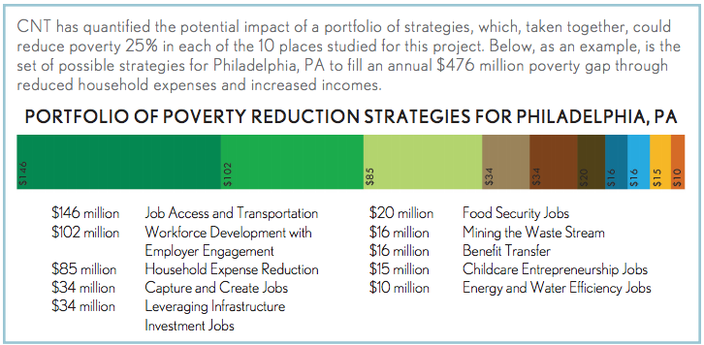
August 05, 2016
When the Democratic National Convention rolled into Philadelphia, city residents stricken with poverty bluntly told The Philadelphia Inquirer that the political hoopla occurring downtown symbolized a system that doesn't help them. Donald Trump or Hillary Clinton? Doesn't matter, 63-year-old Carmen D. Torres of Cambria Street told the newspaper. "Every election, it's still the same."
Oftentimes, the go-to (and, in some cases, vague) solution proposed by politicians is to create more jobs. That works, according to a new report from the Center for Neighborhood Technology (CNT), a nonprofit based in Chicago. But just having a job only solves half the problem, the report suggests, and attacking the other half of poverty's vicious cycle could help cities better tackle the problem.
As City Lab put it, implementing the strategies in the CNT's Urban Opportunity Agenda, released Thursday, could cut poverty "rather drastically" in U.S. cities – by 25 percent, to be precise. The seemingly simple fix: Yes, get people employed, but take serious steps to reduce their daily expenses as well.
The report used Philadelphia as its prime example. By also cutting residents' transportation and utility costs, for example, you save them money they'd otherwise be spending. That ties into employment, since by creating jobs closer to people in poverty, you save them the cash they'd use to buy a transit pass or fill up their tank. City Lab explained in more detail:
Transportation costs are the third-biggest income-eater for low-income Americans, after housing and food. For Philadelphia, the biggest-ticket poverty-reduction item is expanding transportation access, with goals to reduce the need for workers at every income tier to drive alone, and to open up jobs previously too hard to get to. Relying on the CNT’s Housing and Transportation Affordability Index, the CNT estimates that if Philadelphia grew the number of jobs accessible by a 30-minute transit ride by 12 percent, that could translate into roughly 4,700 newly accessible jobs for people living in poverty.
...
Philadelphians would also feel cost savings by leaving their cars at home. “A 20 percent decrease in auto travel could save a low-income household [an average] $490 per year in Philadelphia,” says Jen McGraw, a sustainability specialist with the CNT. “Multiplied across 40,000 households, that could be $20 million a year in expense reductions for low-income households.”
The CNT broke down how implementing a combination of strategies like these could hit their target of reducing Philly's annual $476 million poverty gap in an infographic:
